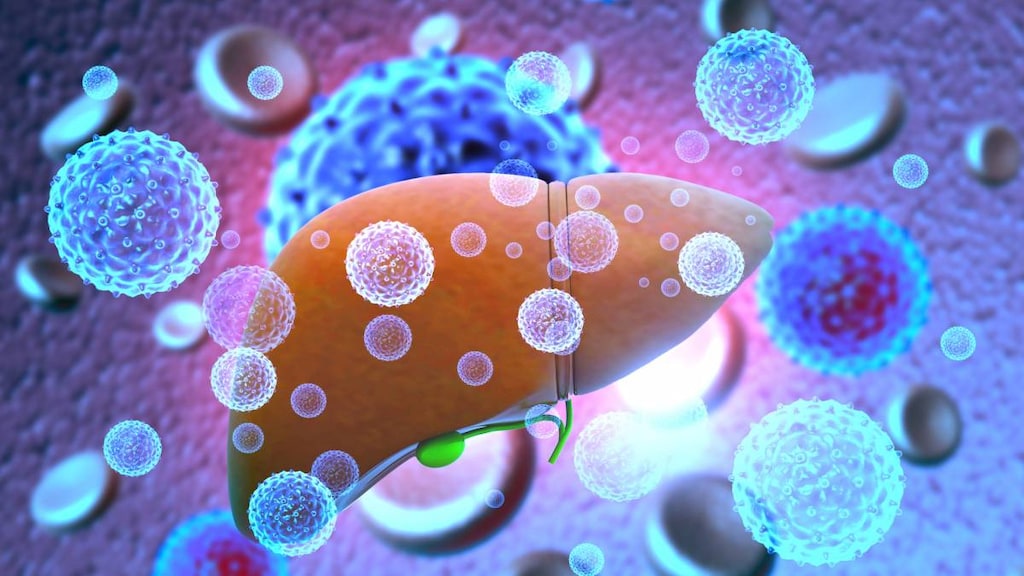
Hepatitis C is an infection of the liver. It is caused by a virus that came from another person. If not treated, hepatitis C can permanently damage the liver.
What Is hepatitis C?
Hepatitis C is a type of liver disease caused by a virus.
The virus causes inflammation in the liver. Your liver does many important things. It removes harmful chemicals from your blood, fights infections, helps you digest food, makes substances important to your health, and stores energy. Damage to the liver caused by the hepatitis C virus can cause serious problems.
How does having hepatitis C damage the liver?
Long-term inflammation of the liver due to hepatitis C infection can lead to cirrhosis (pronounced: sir- OH-sis).
In the process of cirrhosis, healthy, active liver tissue dies and is replaced with scar tissue. Cirrhosis increases the chances of getting liver cancer and liver failure.
How do I know If I have hepatitis C?
Most people infected with hepatitis C don’t know it.
There may be no symptoms after a person first becomes infected with the virus. Or if symptoms do occur, they are so mild that the person doesn’t seek medical care.
Sometimes the immune system clears the virus from the blood and liver. However, more commonly, the virus persists inside the liver and bloodstream for many years.
In response to the persistent viral infection, the liver becomes inflamed. This inflammation slowly damages the liver. This is called chronic hepatitis C. It can be present for 10 to 20 years without any symptoms.
Many years of long-lasting inflammation can lead to irreversible scarring of the liver (cirrhosis), liver cancer, and liver failure.
That’s why it is so important to get tested for hepatitis C. A blood test is the only way to know you have it before damage to the liver becomes severe.
How contagious is hepatitis C?
It depends on the type of exposure.
It’s very contagious if even a little blood from a person with hepatitis C gets into the bloodstream of another person.
Other bodily fluids, such as semen and vaginal fluid, can contain the virus, but in much smaller amounts. So, the risk of infection with a steady sex partner with hepatitis C is low.
You can only get hepatitis C when you come into direct contact with blood or other body fluids that contain the virus.
You can’t get hepatitis C from:
- hugging
- sneezing
- coughing
- sharing food or utensils
How does someone get hepatitis C?
Hepatitis C can be passed from one person to another in these ways:
- Using a needle or syringe that someone else has used to inject drugs, or sharing items used to snort cocaine.
- Having had a blood transfusion or organ transplant before 1992 (before blood donors were regularly tested for the virus).
- Getting tattoos or body piercings with equipment that is contaminated with the virus.
- Sharing a toothbrush, razor, or other item that might have traces of blood.
- Having unprotected sex with a person who has hepatitis C.
- Health care workers can accidentally get the virus by being stuck with a contaminated needle.
- A pregnant woman infected with the hepatitis C virus can pass it to her baby during delivery.
Should I be tested for hepatitis C?
There are two very good reasons to know if you have hepatitis C:
- you can take steps to avoid passing it to others
- you can start treatment to get rid of the virus
Treatment greatly lowers your chances of getting cirrhosis or liver cancer, needing a liver transplant, or dying from liver failure.
Having a test for hepatitis C is especially important if you may have been exposed to the virus. You should be tested if you:
- were born between 1945 and 1965—hepatitis C is fairly common in this age group.
- injected or snorted drugs in the past, or do so now
- had a blood transfusion before 1992
- had surgery before the mid-1980s
- undergo dialysis for kidney disease
- were born to a mother with hepatitis C
- have served time in jail
- got a tattoo or body piercing in a shop that was not regulated by its state and did not have a high safety rating
Tests for hepatitis C
There are two basic blood tests for hepatitis C:
- Antibody test: This test looks for antibodies against the hepatitis C virus. Antibodies are substances the body makes when it detects a virus.
- Virus test: This test looks for the virus itself. It is called a hepatitis C RNA test (HCV RNA, or RNA test).
If you have a negative antibody test, you probably do not have hepatitis C. A positive antibody test plus a positive RNA test usually means an active, chronic hepatitis C infection.
When the antibody test is positive but the RNA test is negative, it can mean that the antibody test was not accurate (false positive) or that you may have been infected with hepatitis C in the past, but your body was able to fight it off.
Treatment
The most effective treatment for hepatitis C involves taking one or more drugs for several months.
When to treat hepatitis C, which drugs to use, and for how long depend on several things. These include:
- your overall health and medical history
- what type of hepatitis C virus you have (there are several forms, or genotypes)
- potential side effects
Today, drug therapy is often able to “cure” hepatitis C. That means that there is no sign of the virus in your blood six months after you’ve stopped treatment. If you are not “cured,” your doctor may suggest a different set of drugs.
During treatment
Some helpful information if you are being treated for hepatitis C:
- If you are taking medications to fight hepatitis C, it’s important to take them exactly as prescribed. If you don’t, the medications may become less effective (that is, the hepatitis C virus becomes “resistant” to the drugs). Since it is so important not to miss even one dose, contact your doctor if you have any concerns.
- The newest hepatitis C drugs tend to have fewer side effects than older drugs.
- Never stop taking your medicines without talking with your doctor first.
Protect your liver!
Alcohol and many drugs can be hard on your liver. Avoid alcohol and don’t take any vitamins, herbal supplements, or over-the-counter pain medicines without talking to your doctor first. They can increase liver injury.
Also be sure to review with your doctor all the medicines you take—both prescription and over- the-counter. That can help you be sure they are safe for your liver and won’t interact with any of the medications you take to treat hepatitis C.
Finally, take steps to avoid getting infected again.
The dangers of cirrhosis
Cirrhosis is a disease in which normal liver cells are replaced by scar tissue.
This change interferes with all of the liver’s important functions. The damage can be so severe that the only treatment is a liver transplant.
Cirrhosis has many causes. Some people inherit genes that nudge them toward cirrhosis. In the United states, the most common causes are hepatitis C, drinking too much alcohol, and fatty liver disease.
Symptoms and signs of cirrhosis include:
- fatigue
- loss of appetite
- weakness
- weight loss
- fluid accumulation in the legs (edema) and abdomen (ascites)
- loss of muscle
- increased bleeding and bruising
- jaundice, a yellowing of the skin and eyes
- itching
- confusion
Spotlight on the liver
The liver is your second largest organ (the skin is the largest).
The average adult’s liver weighs about three pounds. No body organ performs a wider variety of essential jobs than the liver. The liver:
- makes proteins that help blood clot
- removes or neutralizes poisons, drugs, and alcohol
- makes bile, which helps the digestive system absorb fats and cholesterol from food
- helps keep blood sugar from going too high or falling too low
- regulates several hormones
Getting tested for hepatitis C is especially important if you were born 1945 and 1965 or had a blood transfusion prior to 1992. It can be cured, and ignoring the possibility of a hepatitis C infection could leave you with a damaged liver—one of the most important organs in your body.
Talk with your doctor
Whether this is a first visit or a follow-up, here are some questions to ask your doctor:
- Do I need blood tests to find out if I have hepatitis C?
- Can you tell how much liver damage I have?
- Do I need to start treatment now?
- What do you consider to be the best drug treatment for me?
- What side effects can I expect and how can I keep them to a minimum?
- What can I do to prevent spreading hepatitis C to my family?




